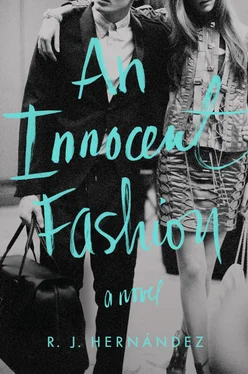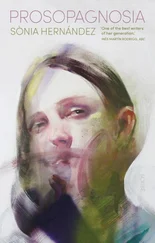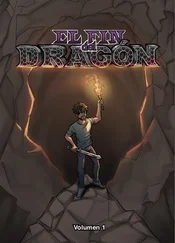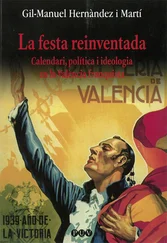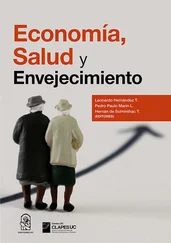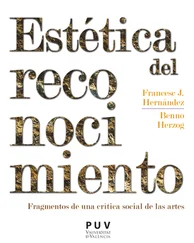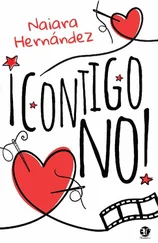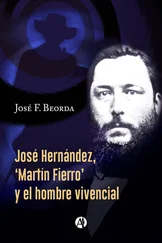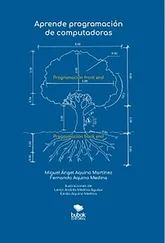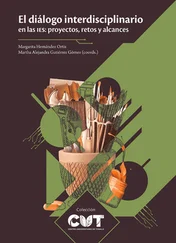“Only if they’re married,” I said, encircling his neck with my arms. “It’s a full commitment.”
“Well then, I guess I’d get married, and become a housewife.”
“You would hate that!” I declared. “You can barely keep still as it is. Imagine hanging around a big house all day — you’d kill yourself.”
“Then I’d have a nanny,” he said, “so I could do other things.”
“A nanny?” I cried. “Then what would be the point of having kids if you wouldn’t even take care of them?”
“Oh, I don’t know,” he shrugged, “it’d just buy time. I’d have eighteen years at least before I had to make any big decisions again, and nobody would think I was being lazy.”
“Don’t let Madeline hear you,” I said, as I sat up on his lap and clicked my high-heeled toes together. “I’m guessing you wouldn’t breastfeed either? Just pass them to the nanny?”
“No — I would breastfeed,” Dorian said. He placed a self-conscious hand over his nipple. “Maybe I’d like it — being needed by someone. Don’t you think I’d be good at it? Playing board games, and reading picture books, and—”
“. and cooking, and cleaning, and all those other things that housewives do?” I added. “You would be terrible at that.”
“Oh, get off!”
“And what about sex?” I added, and yanked at the back of his hair.
“What about it?”
“You’d have to have sex with a man. How else would you be planning to make babies?”
He considered this with a far-off look, then suddenly clutched his stomach. “You’re right,” he cringed. “I could never let anybody inside of me.”
“How about inside here?” I poked him in the belly button.
“Stay away,” he warned, and reached for my wrist.
“Why? Maybe you’d like it, if you had some practice,” I laughed, jabbing him once, twice, three times in the stomach.
Dorian wrestled me onto his chest from behind and pinned me into a headlock. “How’s this for practice?” He bit my ear and pretended to rip it off, while I squirmed and kicked and sent Madeline’s lipsticks clattering over the scum-encrusted tile.

IN MY APARTMENT, BELOW MY FOUR-FOOT LOFT BEDROOM, the kitchen light was on.
I flicked it off, not wanting to arouse my roommates’ suspicion, although on looking back, it would have appeared less strange for me to be holding a knife in the light (I could have been cutting anything — a pepper, a tomato) than in the dark. Trying to find the knife drawer, I felt around the shadowed countertop and my hand grazed the cutting board and the brittle rind of an orange, which had been left out.
I touched the side of the counter; a cold drawer handle. An uncanny shudder crawled over my neck, as if I expected to reach into the drawer and find a hand there waiting for me. Instead, my fingers fell upon a steak knife. Its predictably serrated edge — one spike after another, its power ruled by order — gave me comfort. The remaining contents of the drawer consisted mostly of ordinary, harmless dinner knives with rounded tips. They were all different sizes and designs, collected over the years from a shifting cast of tenants and never traded out for a new set. I groped around until I found the one I was looking for: the paring knife, small and pointed.
I wrapped my fingers around the plastic handle and just held it inside the drawer, perfectly still for at least a minute. My behavior had no precedent. I had never cut myself as a teenager, and honestly, I had never even thought about it before. I must have been staring at my screen saver, or commanding Dorian to complete a task, when my self-hatred flipped a switch in me, and I remembered that when other people felt miserable, they sometimes cut themselves. The idea had gotten under my skin. I figured that if it made those people feel better, maybe it would make me feel better too. But even now, I wasn’t sure I wanted to do it. As far as I could tell, I was just fumbling around in the dark, trying somehow to feel better.
My doubts about life were what made me hate myself the most. I’d never had so much doubt . I used to feel so sure of everything — sure that the world would bend to me, like I’d been promised; sure that, as the aphorism dictated, all I had to do in life was “be myself” and wait for the rewards. Trying to “be myself,” however, had almost resulted in my disqualification from my own dream, and that other gem—“work hard”—had lately seemed more and more laughable. Once you were through with those tenets, there was little in the way of common wisdom that could be trusted.
If I hadn’t been so embarrassed, I would have called Ms. Duncan, my high school English teacher. She had taught me that excellence assures success, and my supposed excellence had gotten me gratefully through college. But what if, in the real world, excellence was replaced in value by money, beauty, social power — all the gifts I didn’t have, whose importance I had wrongly believed could be circumvented by the loophole of my own merit?
How had everyone else done it? It was no secret that Jane Delancey had been an ordinary shopgirl at Barneys, back on Seventh Avenue, when she was discovered by Ava Burgess. The newly promoted editrix-in-chief, had been seeking fresh talent for her growing fashion team when she simply took a liking to Jane while buying a veiled hat for her upcoming thirtieth birthday party. It turned out the two had the same birthday — Ava was a year older — and two weeks later, Jane was filing Ava’s papers, two years later, Jane was masterminding Ava’s photoshoots; and that was it. It was your typical rags-to-riches story, with no plot twists along the way. The rise to the top had been similarly untroubled for Edmund, who had once been a Hoffman-Lynch postal boy. How he went from that to fashion director — well, who knew? But if he and Jane could get there from selling hats and passing out the mail, anyone should be able to do it, especially with an Ivy League degree. After all, wasn’t that the purpose of having one — so you could trade it in for a seat at your dream job, with your name in italics on a silk cushion?
I wasn’t like Dorian or Madeline, who could retreat into their parents’ wealth while they loafed their way through Plans A, B, C, and ever after until they found something that “fulfilled” them and gave them an illusion of independence by the age of thirty. No: I was on borrowed time as my savings disintegrated like a Christmas wreath left up too long. Once upon a time the four thousand dollars that I had saved up in college had seemed so substantial, as though it could support me for a hundred years; now, between rent and food and the other costs of scraping by, the amount in my bank account had dipped into three digits, and was quickly plunging lower and lower. If I didn’t make it work somehow— fast —then I would be back to Texas where I had started, where it would be like I had never even come close — to anything.
Every day when I woke up I told myself: Today is going to be the day you make something happen —but I didn’t know how, and nothing ever did happen, except my dread encroaching evermore, like the tide over the deck of a sinking ship.
I stood there breathing heavily while the refrigerator hummed. In one of my roommates’ bedrooms, I heard a sitcom on TV. The laugh track sounded like something shattering over and over, a vase that kept on getting broken and put back together again.
I pulled out the knife abruptly from the drawer and held it straight by my side, taking giant, harried steps to the bathroom. With a deep breath, I pressed my back against the door; locked it, and raised the knife to the fluorescent light. Having used it before to open the stitched pockets of my Dior suit, I knew the edge was a little dull. I pressed its tip against my wrist and slowly twisted, trying to draw blood. My skin puckered, like the navel of an orange. I slackened my grip, unsure now if I really wanted to do it. For some reason, I was remembering a movie I had seen in which a class full of Japanese schoolkids had been made to kill each other. They were dying left and right, and every time one of them got stabbed or shot or hacked at with an axe, the blood would come shooting out like a red geyser. My own blood raced now at the thought. I imagined every drop in me like a sperm cell in a Sex Ed video, except instead of swimming happily toward an egg, they were in a panic, trying desperately to escape my knife. I didn’t blame them; if I were a drop of blood, I wouldn’t want to go geysering all over the place either.
Читать дальше
